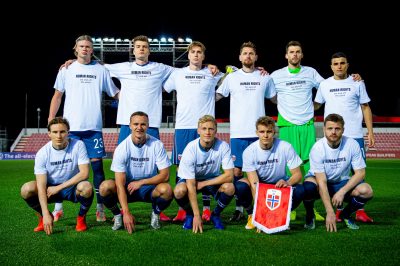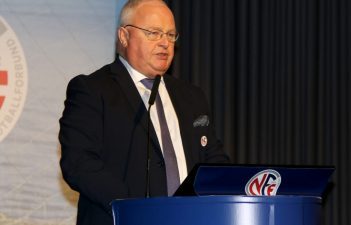Intense pressure from Norwegian football fans and players has prompted Norway’s national football association to join a Nordic effort to put more pressure of their own on the international football federation FIFA. They clearly prefer more influence over FIFA to any boycott of the 2022 FIFA World Cup in Qatar, where officials have been accused of serious human rights violations and horrific treatment of migrant workers.

In a joint letter sent to FIFA on Thursday, the Nordic groups are, at the very least, marking their dissatisfaction over how FIFA has responded to the concerns about migrant worker abuse. The letter clearly points out that the football associations in Denmark, Sweden, Norway, Finland, Iceland and the Faroe Islands aren’t just concerned about the difficult conditions under which migrants have worked while building World Cup venues, but also about those working in the hotel, restaurant, transport and other service sectors in Qatar.
Terje Svendsen, president of the Football Association of Norway (NFF), is among those signing the four-page letter (external link) to FIFA President Gianni Infantino and FIFA Secretary General Fatma Samoura. Sent on the eve of the FIFA Congress on Friday, it specifically urges FIFA to confront officials in Qatar with independent reports and investigations regarding deaths and injuries among migrant workers in Qatar in connection with World Cup-related facilities. It demands a “complete implementation” of already-adopted workers’ rights legislation in Qatar, that human rights organizations be allowed to enter Qatar, and that basic freedoms are respected. The football organizations also want FIFA to “ensure compliance of workers’ and human rights at all facilities used before, during and after the World Cup.”
‘Heated debate’
The six football organizations including Norway’s notes that “the debate” over human and workers’ rights issues in Qatar “is as present as ever before.” The debate was described as “heated” in both Nordic and European media: “Our fans are taking a stance on the organizing of the World Cup, demanding rightly that we, as member of FIFA, take responsibility for the human and workers’ rights in Qatar.”
The uproar over how migrants have been killed and injured while working on World Cup-related facilities in Qatar “is not just a problem for FIFA, or for Qatar or the Nordic football associations alone,” the Nordic football presidents wrote.” It’s also a problem for “the football community across the globe,” since “our beautiful game” should also be a “responsible game, proving that the theater of the greatest dreams in football can also be the stage of human rights, respect and anti-discrimination.”

Svendsen, the Norwegian president, told state broadcaster NRK that the letter was sent because “we got some answers” to questions raised during a meeting with FIFA on May 10, “but we want more concrete and committed answers now.” The associations want conditions for migrant workers to be further improved and verified, and weren’t satisfied with FIFA’s response to that so far.
NRK’s sports commentator Jan Petter Saltvedt said the letter mostly represents a desire by the Nordic football officials “to make their mark” in addressing concerns at home. Saltvedt does think it’s a “positive” initiative: By standing together, the Nordic countries have more strength behind the demands they’re making.
Svendsen confirmed the Nordic associations want to put pressure on FIFA. “This is an important signal to FIFA that we are worried and demand more action,” Svendsen told NRK.
Warding off a boycott
Svendsen is clearly also keen to ward off ongoing demands for a boycott of the World Cup in Qatar that have come from supporters (fans) of Norwegian football clubs. Norwegian players have also mounted various displays of discontent over workers’ rights in Qatar.
A commission set up to examine concerns about the World Cup in Qatar recommended against a boycott earlier this week. Sven Mollekleiv, a former head of the Norwegian Red Cross, headed the commission and reported that a majority of 12 commission members didn’t think a boycott was “the most effective” means of achieving lasting change in Qatar and FIFA. Only the two commission members representing football supporters continue to call for a boycott.
The commission did find that FIFA has taken too little responsibility for the conditions under with migrants have lived and worked in Qatar, even though it’s responsible for the World Cup. It suggested that improvements that have been made have mostly come at the initiative of the local organizing committee in Qatar, under pressure from the international community.
newsinenglish.no/Nina Berglund

